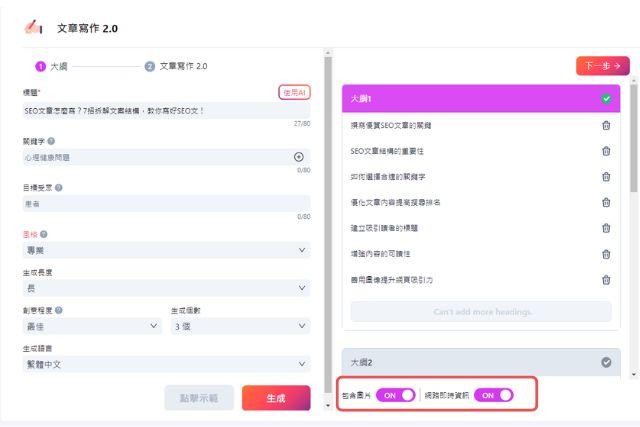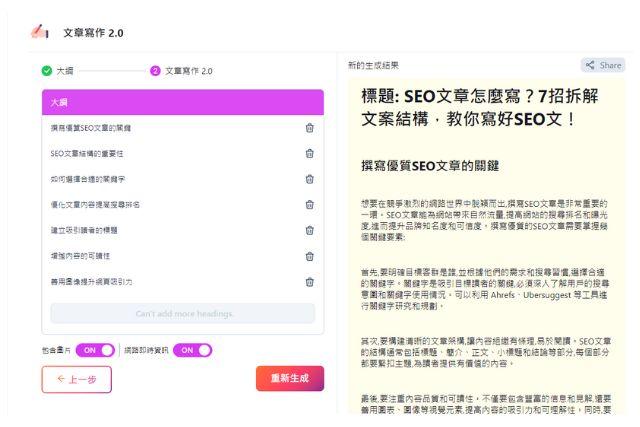How to write SEO articles? Get your article on the home page with these 6 steps
2025/04/07

In this era of Internet explosion, writing good SEO articles can bring amazing exposure to your website. How to write SEO articles? Are there any details that need attention? Today GenApe will take you through what you should pay attention to when writing SEO articles, and teach you 6 steps to write good SEO articles.
- What is the difference between SEO articles and general articles?
- 1. Confirm the goal and audience of the article
- 2. Develop target keywords and strategies
- 3. Content writing
- 4. Adjust other items that are helpful for SEO
- 5. Submit the article to Google for indexing
- 6. Analyze SEO and continuously optimize content
- SEO Article Frequently Asked Questions
- Write SEO articles quickly
What is the difference between SEO articles and general articles?
SEO articles are written for search engines and people to read. When Google officially releases them in 2023, it will also attach great importance to Search Generative Experience, so it is recognized Good SEO articles also need to meet the user experience , and general articles will be read by people, and they will be different according to different purposes, content length and depth, keywords and search intentions.
1. Confirm the goal and audience of the article
First of all, before you start writing content, you must first have a clear understanding of your brand’s marketing direction. You can think first Who are your products or services designed to satisfy? Who might be interested in your product? Who was this article written to appeal to? The article itself is the vehicle for providing information, so understanding who will want to know the information you provide is the first goal.
For example, if you are doing SEO for a mobile phone manufacturer today and the goal is to promote your own mobile phone, you can think about the reasons why the audience may search for mobile phones online. For example, they may want to know the performance of the mobile phone and search for mobile phone performance reviews, or they may want to buy a mobile phone and search for mobile phone performance reviews. Search for mobile recommendations and more.
2. Develop target keywords and strategies
After determining the goal of writing the article, the next step is to formulate target keywords and strategies. After finding a main keyword first, start thinking of other related keywords from it. It is recommended to match it here Google ads keyword planner tool Helps you observe search volume and related keywords. It is also recommended to observe the search results on the first page to understand what content the audience may want to know, so as to avoid writing articles that do not meet the audience's search intentions. When looking for keywords, you can use the following figure to list the main keywords first, and then extend the related keywords outward.

3. Content writing
In addition to writing content that must comply with SEO search intent, the article writing content is usually written in a 5W1H writing method and uses a topic-breaking method. If you want SEO articles to rank well, they need to be original, diverse, and professional. The content should be as high in information density as possible and have professional content. , do not add too many adjectives and redundant words, avoid content farms, and content writing will need to put keywords and related keywords into the article.
Writing an SEO article takes at least 2 hours from planning, structure, and writing, and the daily output will be limited. With the help of the AI article generator, you can increase the number of articles you create. Just go to GenApe. In the article writing or SEO tagging tool, find the article writing template, enter the article title, related keywords, and adjust some parameters to generate the SEO article structure.
Click the link below to read more content writing tips

You can adjust the order and content of the article structure, and click Next to start generating articles. It will take less than 10 minutes to have an SEO article. As long as you slightly adjust the content and post it to your blog, you will easily have an SEO article.

Help write an article immediately: https://app.genape.ai/templates/articleBetaVersion
4. Adjust other items that are helpful for SEO
After the article is written, the next step is to adjust the content that is helpful for SEO. They are Meta Title , Meta Description, CTA and structured markup, which will be explained in detail for you next.
Meta Title
The Meta Title is the most conspicuous part of the search engine results page and is also the first decision point for users to click on it. Think of it as the signature of your website. A successful Meta Title should be concise, attractive, relevant, and contain target keywords. .
For example, if you are doing SEO for a mobile phone manufacturer today, the goal is to promote your own mobile phone, and the content of the article is mobile phone recommendations. Then the Meta Title can be designed as "The latest mobile phone performance ranking in 2024 - a buying guide suitable for you."
Meta Description
Meta Descriptions have a small impact on search rankings, but are crucial to attracting clicks. The ideal Meta Description is a brief summary of the article content and piques the reader's interest. , and control the length between 75-100 words, and include target keywords and long-tail keywords.
Additionally, Meta Description can be adapted to different target audiences. For example, if the article is about mobile phone performance evaluation, you can focus the Meta Description on attracting the audience to understand which mobile phone is the king of performance. This part can be written with the help of GenApe's Meta Title & MetaDescription generator. Click the link below to try it now:
Click to try it now: https://app.genape.ai/seoBlogPost

Call to Action (CTA)
A CTA is an integral part of an article and is designed to guide the reader to take the next step , such as reading more related content, subscribing to a newsletter, or purchasing a product. A good CTA should be concise and placed at the heart of the article.
For example, if today's article is a mobile phone recommendation list, the CTA can be designed as: "View the latest mobile phone performance reviews now to help you quickly find the most suitable mobile phone!" Or set it to "Click here to learn about the most popular mobile phone models. and preferential prices!" to attract more user interaction. GenApe also provides a call-to-action generator, please click the link below to try it out.
Click to try it now: https://app.genape.ai/callToAction
Structured markup (Schema)
Schema is a way for search engines to understand the content of an article more clearly. For example, adding Schema markup to a product review article can display detailed information such as star ratings and prices in search results to further attract readers to click. Common forms include questions and answers, store reviews, product introduction s, news articles, etc.
If today's article is about mobile phone recommendations, you can add the "Product" structured tag to the article to let search engines know clearly that this is an introduction to the product, and display information such as "price range" or "user ratings". At the same time, you can also add structural tags for "purchase links" to improve user experience.

5. Submit the article to Google for indexing
After all the optimization is done, the next step is to get search engines to quickly crawl and index your article content. Although Google's search engine will automatically crawl to website content, it is still recommended to actively submit it to Google for indexing. The following is through Google Search Console Detailed steps for submitting an index.
- Sign in to Google Search Console.
- Select the corresponding website properties.
- Enter the full URL of the article in the "URL Check" field and click "Request Index".
Submitting relevant URLs can help search engines quickly crawl and present articles in search results, allowing users to quickly find and read your analysis.
6. Analyze SEO and continuously optimize content
After an article is published, analysis and ongoing optimization are key steps to improving SEO performance in the long term. Use Google Analytics and Google Search Console to help track changes in traffic sources, user behavior, and search rankings.
Google Analytics
Google Analytics provides detailed website traffic reports, including data such as bounce rate, average dwell time, and page views. For example, if an article has a high bounce rate, you may need to format the content or add more engaging paragraphs to keep readers on the page longer.
Google Search Console
Google Search Console provides data such as click-through rate, impressions, and rankings to help you discover which keywords and content perform best. For example, if the ranking of an article for the keyword "mobile phone performance comparison" drops, you can consider re-optimizing the paragraph or adding more relevant content.
Continuously optimize content
SEO is a dynamic process that requires content to be constantly updated with search trends, and information that has reached the homepage may leave the first page due to factors such as changes in search intent or algorithms. For example, if today's content is a mobile phone buying guide, you can regularly update the latest mobile phone model information to keep the content fresh and relevant. Also, observe the patterns of successful articles and apply them to future content creation to continuously improve your SEO performance.
SEO Article Frequently Asked Questions
After reading the key points of SEO article writing, I believe you have a certain understanding of SEO articles. Here are some related common questions to answer:
What is an SEO article?
SEO articles refer to articles that are specially optimized for search engine algorithms, that is, articles that are easy to read for readers and search engines.
How can we make SEO better?
When Google ranks websites, the most important thing to focus on is whether the content is helpful to users. Therefore, as long as you write articles that are valuable, attractive, or provide a good experience for users, it will help rankings. of.
How long will it take for the article to be ranked?
For those who are new to SEO, the initial ranking may not be ideal. It is possible that Google will not index your article, so it is recommended to observe it for 1 to 3 months. After that, if you have written many articles, or it is a website that already has a certain authority, you will usually get a good ranking within a week. .
In addition to writing articles, are there any other ways to optimize SEO?
In addition to writing articles, increasing links inside and outside the website, optimizing website performance, and cooperating with social media or bloggers to increase exposure opportunities will all help optimize SEO.
How many keyword density should be added to SEO articles?
SEO article keyword density Currently Google does not release correct data. If you put keywords in appropriate content, it will have a bonus effect on the article. However, if you deliberately add a large number of keywords, Google will deduct points. And affect SEO ranking.
How long should an SEO article be?
This part is not fixed. The length of the article will vary according to the competition level of the target keyword. It is recommended to adjust it according to the search results of the target keyword.
What to do if SEO content is duplicated? There’s not that much to be original about
When writing SEO articles, it often happens that all the content that can be written has been written on the first page, and there is no other original content to write. At this time, it is recommended to avoid plagiarism issues by using other words or modifying the structure of the article.
How to maintain a good ranking for a long time?
Google's search engine algorithm is basically updated every few months. The most important thing to stabilize your rankings in each update is to continue to provide high-quality articles. Although there may be other black hat or gray hat methods that can improve rankings in a short period of time, it is very likely that you will be punished in the next algorithm update.
Write SEO articles quickly
If you want to write SEO articles quickly, try GenApe for free. There are many SEO article writing-related assistants to assist you and improve the efficiency of your article writing. Click the link below to use it immediately: https://app.genape.ai/article-writing
Start Using GenApe AI Now to Enhance Productivity and Creativity!
Collaborate with AI and accelerate your workflow!
- 1.What is the difference between SEO articles and general articles?
- 2.1. Confirm the goal and audience of the article
- 3.2. Develop target keywords and strategies
- 4.3. Content writing
- 5.4. Adjust other items that are helpful for SEO
- 6.5. Submit the article to Google for indexing
- 7.6. Analyze SEO and continuously optimize content
- 8.SEO Article Frequently Asked Questions
- 9.Write SEO articles quickly
Categories
GenApe Teaching
User Cases
E-commerce
Copywriting
Social Media Ads
Video And Music
AI Generator
Related Articles

How to write product introduction? 7 cases to teach you how to write excellent product description copy
Product introduction and product description not only help to improve the store's search engine optimization (SEO), but also highlight the advantages and features of the product in the first place, bringing about click-through rate and conversion rate. Product introduction is definitely a key that merchants cannot underestimate. Battlefield, today I will share with you 7 key skills so that everyone can have a clearer direction in writing high-quality product introduction content!
Last Updated: 2025/04/09

How to write a movie script? Publicly available Youtube script examples, the key to successful video marketing
If you want to get views on YouTube, you need to have a good and exciting video. Before shooting the video, the most important thing is to write a YouTube script. Having a well-planned script can also make subsequent shooting and editing faster. , this article will share the skills of Youtube script writing, and quickly master the key to successful video marketing.
Last Updated: 2025/04/07

5 Key Strategies for Beginners in Shopee Business and How to Improve Your Shrimp Vendor Business Skills
Shopee stands as one of Southeast Asia's foremost emporiums, enticing numerous merchants to establish their own emporiums within its precincts. How then, in the competitive realm of Shopee storefronts, does one navigate the intricacies of management? Whether a neophyte or a seasoned practitioner, this discourse unveils the art of cultivating a Shopee enterprise from its inception, offering insights into refining the skills necessary for augmenting your commercial revenue.
Last Updated: 2025/04/07
Categories
GenApe Teaching
User Cases
E-commerce
Copywriting
Social Media Ads
Video And Music
AI Generator
